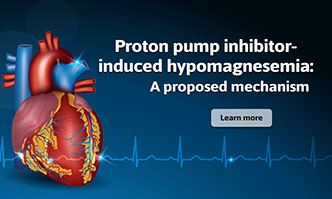
Proton Pump Inhibitor-Induced Hypomagnesemia: A Proposed Mechanism
Gastric acid inhibitors use was significantly associated with the presence of vitamin B12 deficiency, warned a case-control study published in the Journal of the American Medical Association. (1) Vitamin B12, also known as cyanocobalamin, is a water-soluble vitamin. Like the other B vitamins, vitamin B12 is important for protein metabolism. It helps in the formation of red blood cells and in the maintenance of the central nervous system. (2)
Vitamin B12 is found naturally in a wide variety of animal proteins, so the body can obtain the recommended amounts of vitamin B12 by eating a variety of foods including:
- Organ meats (beef liver)
- Shellfish (clams)
- Meat, poultry, eggs, milk and other dairy foods
- Fortified cereals and nutritional yeasts
A lack of vitamin B12 (B12 deficiency) occurs when the body does not get or is unable to absorb the amount of vitamin that the body needs. A lack of B12 can cause: (2)
- Anemia and pernicious anemia
- Loss of balance
- Numbness or tingling in the arms and legs
- Weakness
Additionally, left untreated vitamin B12 deficiency can lead to dementia, neurologic damage, and other complications, which may be irreversible. (1)
It is well established that gastric acid secretion is needed for dietary Vitamin B12 absorption from foods. Vitamin B12 is present in foods bound to proteins, and the presence of gastric acid is required for the peptic enzymes, mainly pepsin, to cleave the vitamin B12 from the ingested dietary protein, allowing its reassociation with intrinsic factor (IF) and eventual absorption in the terminal ileum. (3)
Accordingly, alterations in the gastric acid secretion may lead to malabsorption of vitamin B12. The origin of these alterations could be either natural, such as ageing process, or iatrogenic,[a] such as partial resection of the stomach or acid suppressive therapy.
Proton Pump Inhibitors (PPIs) and Histamine 2 Receptor Antagonists (H2RAs) are two groups of drugs which act by reducing the gastric acid secretion. The most commonly used PPIs include: Prilosec® (Omeprazole), Nexium® (Esomeprazole), Prevacid® (Lansoprazole), Dexilant® (Dexlansoprazole), Protonix® (Pantoprazole) and Aciphex® (Rabeprazole), among others; while the most commonly used H2RAs include Zantac® (Ranitidine) and Pepcid® (Famotidine), among others.
PPIs and H2RAs use was significantly associated with the presence of vitamin B12 deficiency, in a recent case-control study published in the Journal of the American Medical Association. (1) This study involved 25.956 cases, patients having incident diagnoses of vitamin B12 deficiency, and 184.199 controls. An odds ratio [b] of 1,65 for vitamin B12 deficiency was found in the group using PPIs for 2 years or more, while and odds ratio of 1,25 for vitamin B12 deficiency was found in the group using H2RAs for 2 years or more.
These findings have led to the U.S. Food and Drug Administration (FDA), to include additional warnings and precautions in the labels of PPIs and H2RAs. In these warnings and precautions FDA highlights the risk of malabsorption of vitamin B12, and encourages patients and physicians to be cautious when using these drugs for a long period, e.g.
Daily treatment with any acid-suppressing medications over a long period of time (e.g., longer than 3 years) may lead to malabsorption of cyanocobalamin (vitamin B-12) caused by hypo-or achlorhydria. Rare reports of cyanocobalamin deficiency occurring with acid-suppressing therapy have been reported in the literature. This diagnosis should be considered if clinical symptoms consistent with cyanocobalamin deficiency are observed. (4)
While diet-sourced vitamin B12 requires the presence of gastric acid to separate the active vitamin from the proteins, crystalline B12 vitamin does not need to be separated from proteins, since it is presents in its free state. In short-term studies, various acid suppressants (PPIs and H2RAs) have been reported to decrease the absorption of vitamin B12 from foods, but not to decrease absorption of crystalline vitamin B12 which is not protein bound. (3) Accordingly, crystalline vitamin B12 is an appropriate source of this important nutrient, for patients in risk of deficiency, on account of PPIs or H2RAs consumption.

References:
Lam, Jameson R., Jennifer L. Schneider, Wei Zhao, and Douglas A. Corley. 2013. “Proton pump inhibitor and histamine 2 receptor antagonist use and vitamin B12 deficiency.” Journal of the American medical association 310 (22): 2435-2442. doi:10.1001/jama.2013.280490.
U.S. National Library of Medicine. 2015. “medlineplus.gov.” Medical Encyclopedia – Vitamin B12. February 2. Accessed February 24, 2017. https://medlineplus.gov/ency/
Ito, Tetsuhide, and Robert T. Jensen. 2010. “Association of long-term proton pump inhibitor therapy with bone fractures and effects on absorption of calcium, vitamin B12, iron, and magnesium.” Current gastroenterology reports 12 (6): 448–457. doi:10.1007/s11894-010-0141-0
AstraZeneca Pharmaceuticals LP. 2012. “U.S. Food & Drug Administration.” Highlights of prescribing information: PRILOSEC. September. http://www.accessdata.fda.gov/
[a] Iatrogenic: Induced by a medical treatment.
[b] An odds ratio (OR) is a measure of association between an exposure and an outcome. The OR represents the odds that an outcome will occur given a particular exposure, compared to the odds of the outcome occurring in the absence of that exposure.
